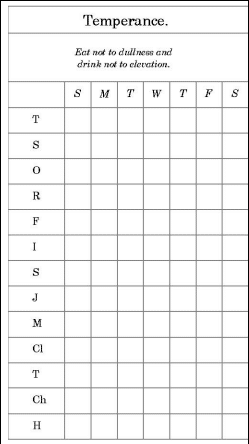Personal Development Help - Readings
Article Focus of the Season: Daily Personal Virtue Practices.
A Practical Guide to Virtuous Living: Benjamin Franklin’s 13 Virtues
By: Nishith Goyal, Book Author
Author of two books, Creator – Be Better Bit-By-Bit, Long-distance runner, and a keen diarist.808 Followers
Published in: Better Humans, 7 min read፣ Apr 13, 2022.
Source: Online link address: https://betterhumans.pub/a-practical-guide-to-virtuous-living-benjamin-franklins-13-virtues-a2bafe95b784
“It was about this time I conceived the bold and arduous project of arriving at moral perfection.”
Benjamin Franklin was a master of the art of productivity.
The book ‘Benjamin Franklin: An American Life’ by Walter Isaacson became a source of inspiration for me to dive into the life of this American polymath. A firm believer in learning, experimenting, and writing, Mr. Franklin devised different productivity tools throughout his life and shared them with the world to experiment.
One such exercise was his Moral Perfection Project. Moral questions played a significant role in Franklin’s life: After initially owning enslaved people, he later became a vocal abolitionist. Franklin was also an on-and-off vegetarian, partly for ethical reasons.

Writing the Autobiography in his 79th year, Franklin looks back to when, at age 22, he undertook “the bold and arduous project of arriving at moral perfection.” He said:
“It was about this time I conceived the bold and arduous project of arriving at moral perfection.
I proposed to myself, for the sake of clearness, to use rather more names, with fewer ideas annexed to each, than a few names with more ideas, and I included under thirteen names of virtues all that at that time occurred to me as necessary or desirable, and annexed to each a short precept, which fully expressed the extent I gave to its meaning.”
I proposed to myself, for the sake of clearness, to use rather more names, with fewer ideas annexed to each, than a few names with more ideas, and I included under thirteen names of virtues all that at that time occurred to me as necessary or desirable, and annexed to each a short precept, which fully expressed the extent I gave to its meaning.”
And here are the thirteen virtues that are equally relevant in today’s time. He chose 13 because that number fits neatly into a calendar (there are 13 moon cycles per year). Multiply 13 by four, and you get 52, the number of weeks in a year.
For each of the 13 virtues, I am giving you ‘Bit-By-Bit’ exercises to practice daily. Not only will these ‘Bit-By-Bit’ habits help you bring consistency, but they also will help you taste the flavours of each of the virtues — daily.
1. Temperance
The virtue: Eat not to dullness; drink not to elevation.
- Mindful eating: Set a timer for 20 minutes and eat your meal slowly, savouring each bite. If not for every meal, double your chewing time for one meal.
- Hydration check: Monitor your daily water intake and set a goal to drink adequate water. Put alarms on your smartphone to remind you to drink water.
- Drink your fluids slowly. Allow the fluid to sit inside the mouth, let the tongue savour the taste, and let saliva work its magic.
2. Silence
The virtue: Speak not but what may benefit others or yourself; avoid trifling conversation.
- Active listening: During conversations, give your full attention and avoid interruptions or unnecessary responses while the other person is speaking.
- Quiet time: Spend 10 minutes daily to silence and observe your thoughts without judgment. Call it boredom. Just let it be.
3. Order
The virtue: Let all your things have their places; let each part of your business have its time.
- Evening routine: Spend 10 minutes every evening to plan and prioritise your next day. It will help you save a lot of minutes the next day.
- Decluttering: Dedicate 20-30 minutes to organise a particular space in your living or working space. Not only will it bring mental clarity, but it will leave your place a lot better and calm.
4. Resolution
The virtue: Resolve to perform what you ought; perform without fail what you resolve.
- Daily review: A to-do list will help you keep a tab on how you are structuring and managing the short and long-term goals. Spend 5 minutes daily reviewing the list. My to-do list is my close partner in building this virtue.
- Accountability partner: Share your goals with a friend and check in regularly to report progress and receive support. I have a WhatsApp group with three of my closest friends. It helps me share small wins, find motivation, create ideas and find solutions.
5. Frugality
The virtue: Make no expense but do good to others or yourself; (i.e., waste nothing).
- Expense tracking: If not daily, do this once in a while. Open an Excel file, download your bank statement and see the big holes. Plug them. Experiment with a ‘Frugality Month’ challenge. Only buy things you NEED and not what you WANT during this month.
- Save more than you expense out: Take this as a challenge. It’s difficult but certainly doable. Start small. Find creative ways to cut expenses to meet the saving target.
6. Industry
The virtue: Lose no time; be always employed in something useful; cut off all unnecessary actions.
- Respect — If you could respect just one thing in this world, do it for TIME. And gradually, TIME will respect to bring this virtue to your life.
- Pomodoro technique: A simple, straightforward method. Break your work into 25-minute focused intervals with 5-minute breaks to maintain productivity.
- Time audit: I do this by using the 168-Hours tracker every quarter. It gives me a wonderful insight into how I am spending my time.
7. Sincerity
The virtue: Use no hurtful deceit; think innocently and justly; if you speak, speak accordingly.
- Journaling: The most important habit of my life. Spend 10 minutes daily writing honestly about your thoughts, feelings, and experiences. A simple habit of writing honestly has the power to change your life.
- Compliment exercise: Give at least one genuine compliment daily to someone you interact with. Else, you can also do this in your journal. Experiment with the emotion of Gratitude.
- Kindness — Be grateful and kind. Exercise kindness at least once in your day. The size of kindness doesn’t matter; the intent matters.
8. Justice
The virtue: Wrong none by doing injuries or omitting the benefits that are your duty.
- Active empathy: Put yourself in someone else’s shoes to better understand their perspective before deciding or judging.
- Volunteer work: It’s tougher than it looks. I have tried multiple approaches to offer my time to society, and every time I have struggled. But for whatever little time I have found success, it helps me remain just in my life.
9. Moderation
The virtue: Avoid extremes; forbear resenting injuries so much as you think they deserve.
- Emotional check-ins: During the day, pause and assess your emotional state. Write a few words in your gratitude journal to maintain balance.
- Digital detox: Set aside specific times when you disconnect from electronic devices during the day. Allow your mind to look beyond the easy choices.
10. Cleanliness
The virtue: Tolerate no uncleanliness in body, clothes, or habitation.
- 10-minute tidy: Spend 10 minutes every day cleaning and organising your living or working space.
- Grooming: An unclean body will keep you unproductive. Respect your body, and maintain daily personal hygiene. Consider grooming as self-care.
- EOD — When the day’s end nears, leave your working desk/home/kitchen platform organised for the next day.
11. Tranquility
The virtue: Be not disturbed at trifles or accidents common or unavoidable.
- Meditation: Practice 10-minute mindfulness meditation to reduce stress and increase mental clarity. I meditate while on the move. My favourite place is a window seat on the bus. When the morning sunlight falls on my face, and my eyes are closed with a focus on breathing — it feels tranquil.
- Gratitude journal: Write down three things you are grateful for each day. Without spending time with my daily gratitude journal, I feel a gap. “What am I grateful for today?” is a simple yet powerful way to find meaning and purpose in life.
12. Chastity
The virtue: Rarely use venery, but for health or offspring, never to dullness, weakness, or the injury of your own or another’s peace or reputation.
- Intimacy check-in: Evaluate your relationships and evaluate areas where you need to practice self-control and create respect for boundaries.
- Deep conversation: Set time for meaningful conversations with your partner or loved ones. ‘Being Busy’ can become an excuse if not dealt with on time.
13. Humility
The virtue: Undersell and overdeliver in everything that you do. Don’t talk about your greatness; instead, be great and give abundant credit to others.
- Seek feedback: When you open yourself to feedback and constructive criticism, it becomes easy for the virtue of humility to enter your life.
- Compliment: Practice accepting compliments gracefully. The habit of deflecting the compliment can often cause harshness in your behaviour.
Closing Thoughts
Mastering these thirteen virtues at once was “a task of more difficulty than I had imagined,” Franklin recalled.
So he decided to tackle them like a person who
“has a garden to weed, does not attempt to eradicate all the bad herbs at once, which would exceed his reach and strength, but works on one of the beds at a time.”
- He made a chart in a small notebook with seven columns for each day of the week and thirteen rows for each virtue he wanted to practice.
- Whenever he broke a virtue, he marked it with a black spot.
- For the first week, he only focused on one virtue, temperance, and followed it without worrying about the other virtues.
- Once he felt confident with this virtue, he moved on to the next one, silence, while still following the temperance virtue.
- He continued this pattern for all thirteen virtues, completing the cycle four times in one year.
That was Benjamin Franklin’s way of inviting all of these virtues into his life; what will be yours?
Nishith is an author and creator of a unique self-development platform — “Be Better Bit-By-Bit.” Grab a copy of his book — Be Better Bit-By-Bit.
Here is another bonus piece, by a different writer.
Nishith is an author and creator of a unique self-development platform — “Be Better Bit-By-Bit.” Grab a copy of his book — Be Better Bit-By-Bit.
Here is another bonus piece, by a different writer.
Benjamin Franklin’s Life Virtues: A Step-By-Step Guide
Much as he knew that setting up a system to follow is an essential step in one’s personal development, Franklin also understood early on that practicing running his life by these virtues in a consistent and ritualistic manner was also vital. There’s no point in having a list unless you can gauge yourself against it constantly.
Now, Franklin wasn’t a stranger to journaling and keeping track of things. Here is a page of a regular day-tracker that Franklin used:
Daily tracking journals and journaling, in general, are in vogue today but look at the clarity and simplicity of Franklin’s journal. And when you think he created this in his twenties during the 17th century, it is that much more impressive. But, it’s not that surprising for a man who once wrote, “Never leave that till tomorrow which you can do today.”
To keep track of his performance across the thirteen virtues, Franklin created a different type of journal, which is very similar to today’s habit-tracking journals. Because he understood the value of focus, Franklin would cycle through the virtues and select one to be the main emphasis each week. From Monday through Sunday, he would make a mark in his journal whenever he wasn’t able to uphold the respective virtue. At the end of the week, he would reflect upon it, trying to understand why it had happened and what he could do in future weeks to prevent it from happening.
It was basically Franklin’s way of doing his weekly review and self-reflection.
Now, Franklin wasn’t a stranger to journaling and keeping track of things. Here is a page of a regular day-tracker that Franklin used:
Daily tracking journals and journaling, in general, are in vogue today but look at the clarity and simplicity of Franklin’s journal. And when you think he created this in his twenties during the 17th century, it is that much more impressive. But, it’s not that surprising for a man who once wrote, “Never leave that till tomorrow which you can do today.”
To keep track of his performance across the thirteen virtues, Franklin created a different type of journal, which is very similar to today’s habit-tracking journals. Because he understood the value of focus, Franklin would cycle through the virtues and select one to be the main emphasis each week. From Monday through Sunday, he would make a mark in his journal whenever he wasn’t able to uphold the respective virtue. At the end of the week, he would reflect upon it, trying to understand why it had happened and what he could do in future weeks to prevent it from happening.
It was basically Franklin’s way of doing his weekly review and self-reflection.

Conclusion
Toward the end of his life, Benjamin Franklin noted that “on the whole, tho’ I never arrived at the Perfection I had been so ambitious of obtaining, but fell short of it. Yet as I was, by the Endeavor, a better and a happier Man than I otherwise should have been if I had not attempted it.”
What he is essentially saying is that moral perfection is, in fact, unattainable. Still, by keeping yourself steady and maintaining good moral values as a compass for your life, you will lean toward that perfection, and you will lead a life that, in the end, you can be proud of.
What he is essentially saying is that moral perfection is, in fact, unattainable. Still, by keeping yourself steady and maintaining good moral values as a compass for your life, you will lean toward that perfection, and you will lead a life that, in the end, you can be proud of.

